Bloomberg: How SBF's Elite Parents Helped Him Build a Crypto Empire?
Title: How Sam Bankman-Fried's Elite Parents Enabled His Crypto Empire
Authors: Max Chafkin & Hannah Miller, Bloomberg
Translation by: Felix & Joy, PANews
In the Bankman-Fried household, Larry David* (*Note: * American comedian *) is a family favorite. So when his parents received an email from their son Sam, their excitement was understandable. SBF wrote that his company FTX would air an advertisement during the 2022 Super Bowl, featuring David as the star.
The irritable comedian has historically played a series of skeptics, essentially a version of David's character from the HBO series Curb Your Enthusiasm set in the Stone Age and Elizabethan times* (*Note: *Curb Your Enthusiasm is a comedy created by Larry David based on his life in the Los Angeles entertainment industry*). In the video, someone would showcase an invention— the wheel, the light bulb, the Walkman, and finally FTX. David would dismiss each invention in succession. The ad would warn viewers that if they did not invest in cryptocurrency, they would miss a historic opportunity to get rich. The tagline was: "Don't be like Larry."
SBF's parents loved it. "Surreal," SBF's mother Barbara Fried wrote. SBF's father Joseph Bankman expressed how happy and proud he was. A few days later, employees received some additional feedback from Sam's brother Gabe. He asked his father if he could play a role in the ad, saying his father was too humble to ask for it himself. In a way, the request was odd. Joseph Bankman had no formal position at FTX at the time, nor did Gabe. Gabe ran a nonprofit supported by FTX that focused on pandemic prevention.
Soon after, Joseph Bankman appeared on set, filming a scene where David vehemently opposed the Declaration of Independence. When told that "the people should have the right to vote," David incredulously replied, "Even stupid people?" Joseph Bankman, wearing a powdered wig, shouted, "Yes!" FTX spent about $20 million to produce and air this 60-second ad. Around the same time, Joseph Bankman joined the company as an employee.

Screenshot of the Super Bowl ad featuring FTX and Larry David. Source: YouTube
A person familiar with the ad's production said that in the twisted logic of FTX, it made sense to have the boss's father play a role. Like most people interviewed for this story, the individual requested anonymity to avoid being associated with the chaotic bankruptcy, numerous class-action lawsuits, and several criminal cases. To some extent, Joseph Bankman was a founder of the company.
Long before their son was accused of fraud, both parents had distinguished careers. They met at Stanford University in the 1980s and taught at the law school for over thirty years, living on campus and raising two sons. Joseph Bankman is a tax expert known for his efforts to make U.S. tax law more friendly to low-income citizens. Barbara Fried is an authority on legal ethics and has a reputation in progressive political circles.
When the ad aired, critics warned that FTX was luring unsuspecting investors with extremely risky financial instruments, most of which were banned in the U.S. The money disappeared after being transferred to a hedge fund owned by SBF without their knowledge. FTX filed for bankruptcy in November 2022.
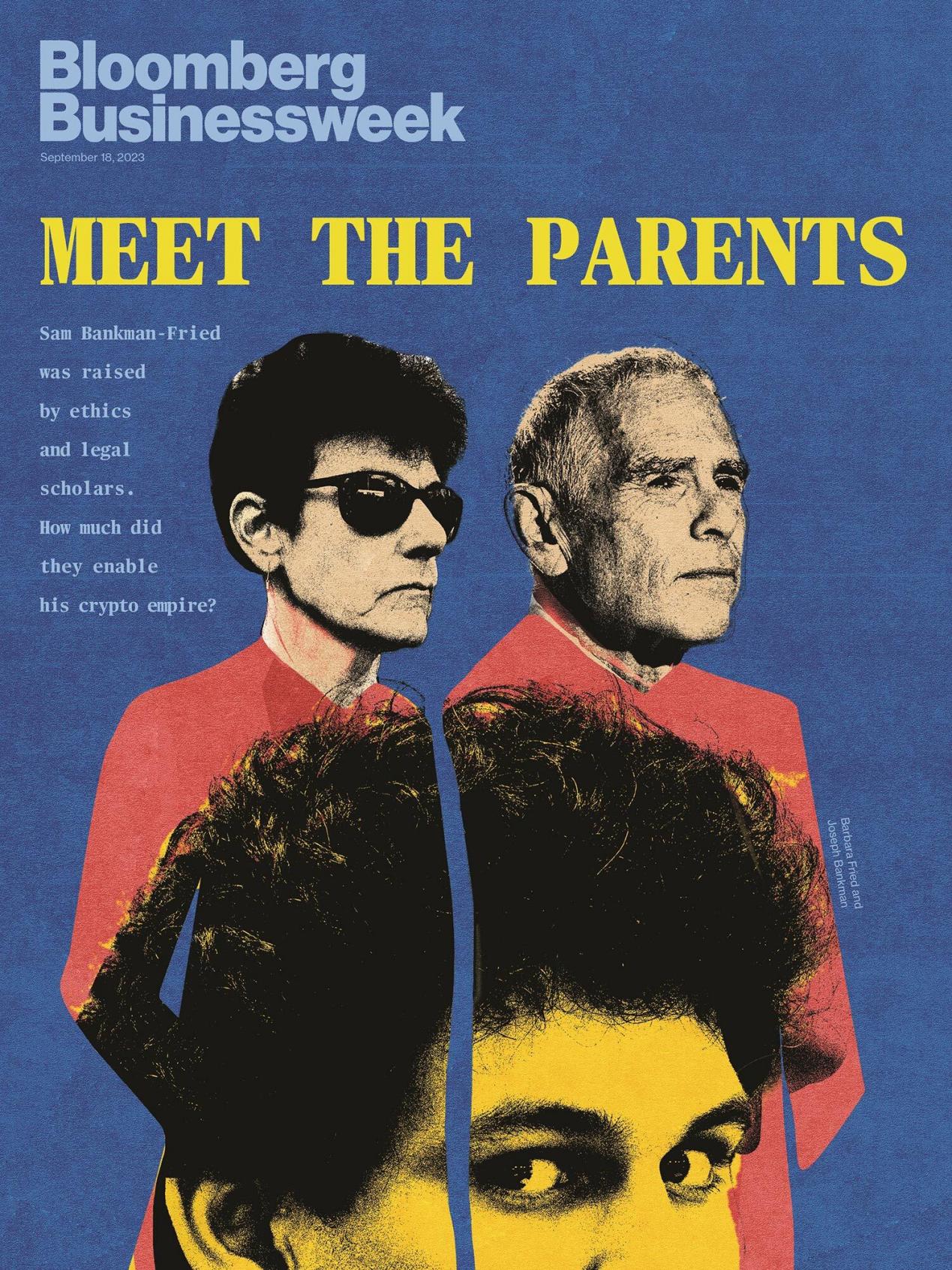
Bloomberg Businessweek Cover
Leading the FTX bankruptcy proceedings is John Ray III, who previously oversaw the Enron bankruptcy, but he described this case as worse* (Note: The Enron scandal refers to the bankruptcy case of Enron Corporation in the U.S. in 2001. Enron was once one of the largest energy, commodities, and services companies in the world, but it filed for bankruptcy protection due to a financial scandal on December 2, 2001, becoming the second-largest bankruptcy case in U.S. history). SBF is accused of using customer funds for his own benefit, as well as that of family and other insiders, and is seeking to recover some of the funds. More ominously for SBF, a criminal case is set to go to trial on October 2 in New York City. Prosecutors have not accused SBF's parents of wrongdoing, but have charged SBF with fraud, money laundering, and bribery, with his net worth estimated at $26 billion at his peak. This case could see SBF spend the rest of his life in prison. However, he has consistently pleaded not guilty, attributing the losses to mismanagement rather than criminality.
Joseph Bankman and Barbara Fried have avoided much of the scrutiny surrounding FTX. This is at least partly because they have not fully explained their roles in helping their son build a vast business and political influence network. Instead, they are often portrayed as bystanders, frequently tearful, providing emotional support as their son appears in court. But their names will almost certainly come up during the trial. The defense team has indicated that their strategy may partly depend on the advice SBF received from lawyers, including his parents.
The couple's spokesperson, Risa Heller, declined to allow Joseph Bankman and Barbara Fried to be interviewed. Risa Heller previously stated that aside from being supportive parents, the couple had little to do with FTX. Risa Heller noted that Barbara Fried never worked at the company, while Joseph Bankman's brief tenure was primarily focused on charitable work. Last year, SBF told The New York Times that his parents "were not involved in any relevant part of his company."
Former employees and business partners say their impressions at the time were quite different, and legal documents show that Joseph Bankman and Barbara Fried were crucial to their son's transformation from an awkward startup nerd to a cryptocurrency mogul. The couple profited handsomely from FTX, netting $26 million in cash and real estate in 2022 alone. They were frequent visitors to the company office, encouraging employee morale and being included in internal communications. Their reputation and connections were vital to FTX's success.
As one of FTX's largest investors, Sequoia Capital published a flattering article stating that their child seemed "born to be the founder and CEO of a cryptocurrency exchange." The article attempted to explain why one of Silicon Valley's most respected venture capital firms chose to invest $150 million in a young man who played video games during investor pitch meetings, providing two pieces of evidence to support its claim. First, SBF had briefly worked at a trading firm on Wall Street. Second, his parents were law professors at Stanford University.
In Silicon Valley, no one wants to think of themselves as privileged. Venture capital firms and entrepreneurs who read Ayn Rand* (*Note: Ayn Rand, * a famous philosopher of the 20th century. * Her philosophy and novels emphasize the concept of individualism, rational self-interest, and a completely laissez-faire market economy*) often bristle at the suggestion that their decisions are not the result of calculated reasoning. However, the reflexive elitism of Silicon Valley is so evident that it hardly needs to be mentioned. The vast majority of investors favor companies run by white founders, who typically come from a small group of elite universities, while avoiding anyone who deviates from their superficial notions of what successful founders should look, talk, and act like. Some openly discriminate against entrepreneurs over 30, those with accents, and anyone who behaves as if they are not wealthy.
In this extremely privileged world, the most privileged place is Stanford University—the birthplace of companies like HP, Sun Microsystems, Cisco, Yahoo, Google, and PayPal. Barbara Fried has a background at Harvard University, Harvard Law School, the U.S. Court of Appeals for the Second Circuit, and the law firm Paul, Weiss. In 1987, Barbara Fried arrived at Harvard as a tenured professor and rented a house on campus. A year later, she met Joseph Bankman. Joseph Bankman graduated from the University of California, Berkeley, and Yale Law School, and after working as a tax lawyer in Los Angeles, he came to Stanford to teach trial advocacy. After Joseph Bankman received tenure in his second year, Barbara and Joseph (as they were known on campus) publicly acknowledged their relationship. They moved in together, and when Barbara Fried's rental house was sold in 1991, they bought it.

The Bankman and Fried home on the Stanford University campus.
SBF's childhood home, where he was "house arrest" in the first half of 2023, is located at the end of Cooksey Lane. It is valued at $3.6 million, though this is more a result of Palo Alto's real estate boom over the decades than a reflection of its luxury. The house is a fairly ordinary gray Craftsman-style building with four bedrooms, three bathrooms, a spacious porch, and a pool, sitting on a large lot surrounded by towering trees. Behind the property is the Lou Henry Hoover House; this modernist building was once home to former President Herbert Hoover and is now the residence of the president of Stanford University.
During SBF's childhood, he was surrounded by a group of young intellectuals—certainly law professors and law students, but also sociologists, engineers, AI researchers, classicists, and social scientists. On Sunday evenings, Joseph Bankman would order takeout or make something simple, like pasta, and they would invite 15 guests to sit in the dining room and chat, usually about philosophy and politics. SBF and Gabe would sometimes join the conversations, even as teenagers. Joseph Bankman and Barbara Fried were proud and committed do-gooders. The couple was not married, as they told friends that it was unfair that same-sex couples could not marry. Paul Brest, former dean of Stanford Law School, said, "They felt it was wrong to take advantage of something that was not open to others. They are very moral people."
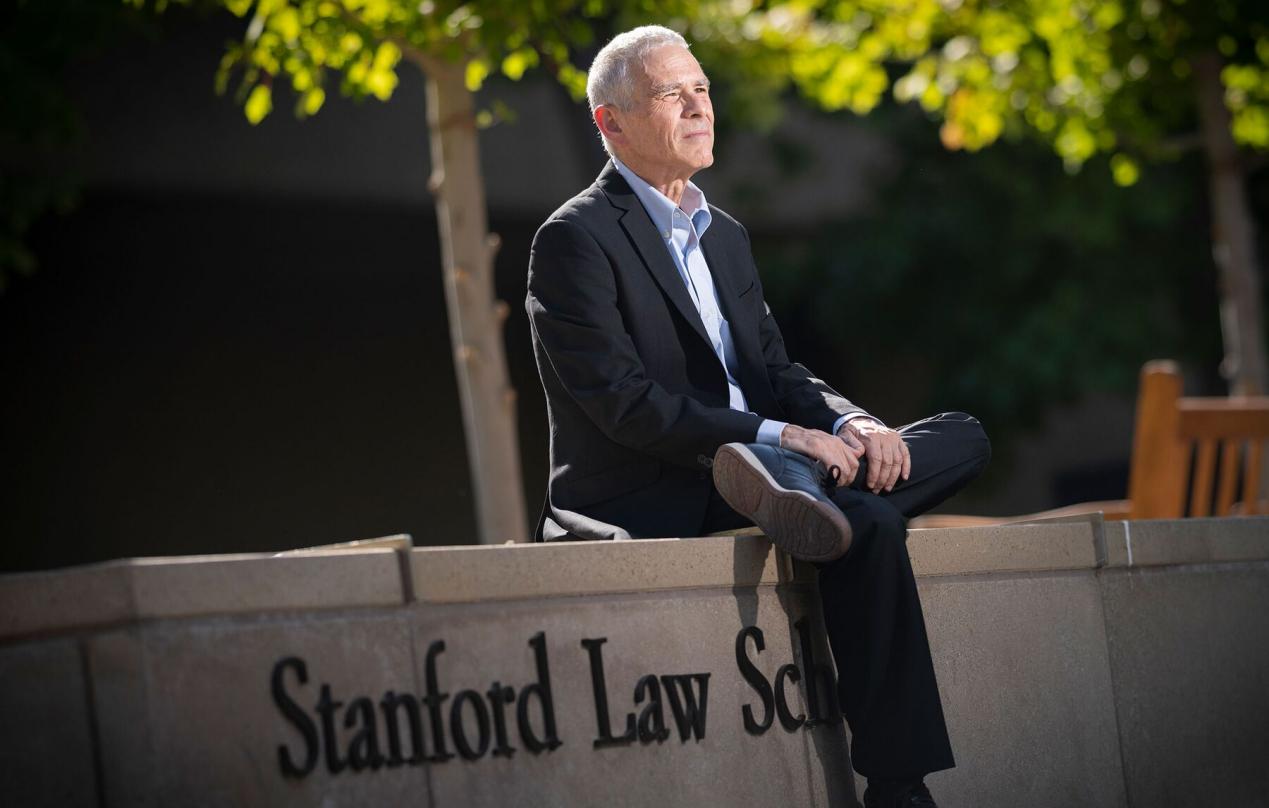
Joseph Bankman at Stanford Law School in 2021.
In his youth, Joseph Bankman had a head of dark curly hair, which his son inherited, along with a likable demeanor that his son did not possess. The couple sent their children to Crystal Springs Uplands School, a $60,000-a-year prep school filled with the children of Silicon Valley elites. By then, Joseph Bankman had become one of the most important experts on U.S. tax policy. He suggested that the California government implement a pilot program that would allow the state to tax them. The plan drew fierce opposition from tax preparation companies and small-government authoritarians, making Joseph Bankman a hero of reform-minded liberals.
To other scholars, Joseph Bankman was a compassionate and tolerant mentor. Rutgers University professor Jay Soled recalled how Joseph Bankman comforted him after a failed lecture. "That's just who Joseph is," he said. "There will be another time; you will only improve." In 2009, while still teaching a full course load, Joseph Bankman entered medical school to become a clinical psychologist. After completing his internship, he began working part-time as a cognitive behavioral therapist while teaching an elective course he developed with Barbara Fried to help law students manage anxiety.
Barbara Fried is a more intellectually gifted scholar than her husband, and while she is popular on campus, she has also gained a reputation for triggering student anxiety while helping them manage it. Her academic research focuses on a branch of ethics known as consequentialism, which holds that the outcomes of actions are more important than abstract concepts of right and wrong. These ideas became something of a family creed. The principle is to do good for as many people as possible, but to summarize it in a less charitable way, it is "the ends justify the means."
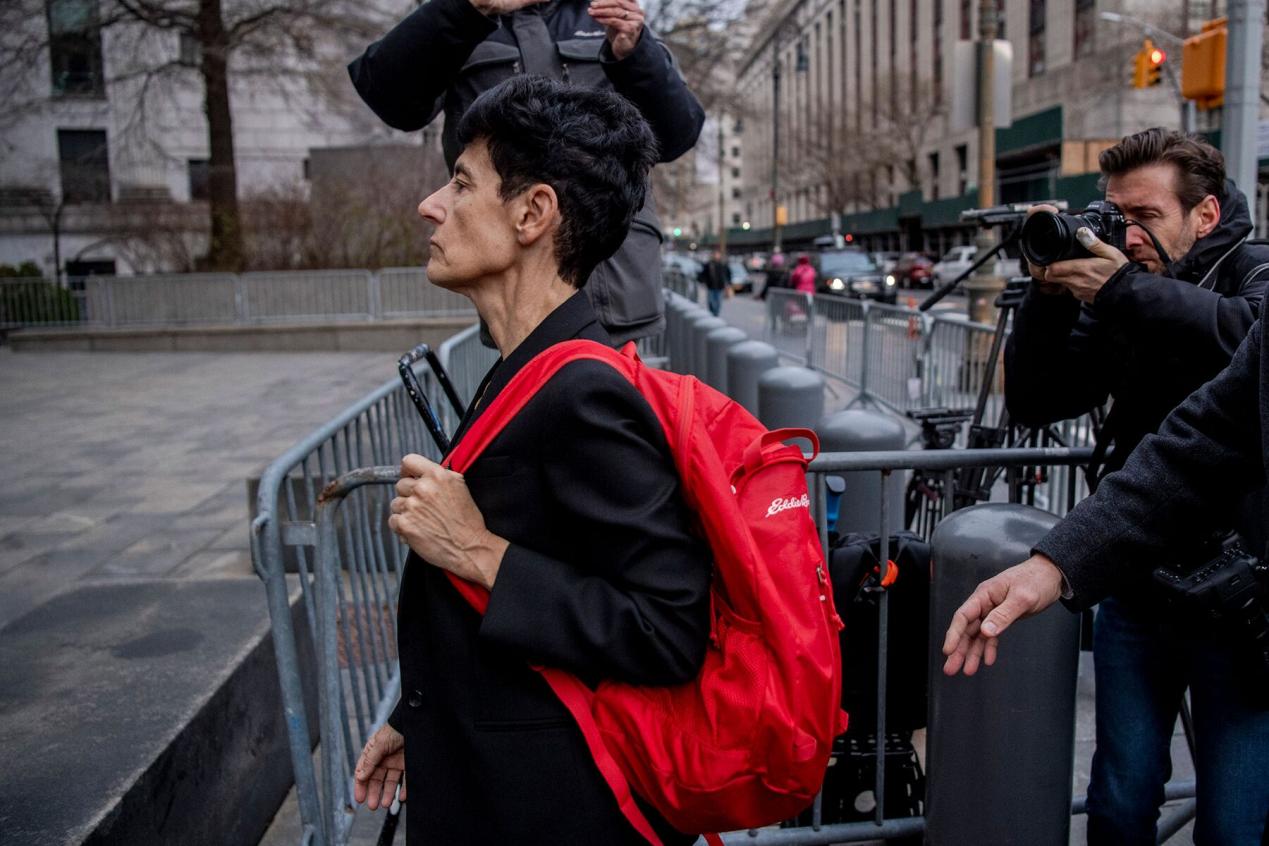
Barbara Fried
Barbara Fried is best known for a paper focusing on the "trolley problem," a famous thought experiment involving a train destined for tragedy. It is primarily used by philosophers to debate moral choices: should you divert the train and kill one person standing on the next track, or do nothing and let a group of people on the main track die? Barbara Fried's paper argues that the question is nonsensical, obscuring the moral choices policymakers face in real life—such as how much aid to provide to the poor or how much healthcare to offer to the uninsured. "There are hundreds of thousands of pages on this," said Paul Brest, former dean of Stanford Law School. "My feeling is that once Barbara Fried solved the trolley problem, there was nothing more to say."
SBF placed his mother's self-righteousness at the center of FTX's marketing. His company may have officially been in the business of selling cryptocurrency, but that was merely a way to generate revenue for a life-saving cause. In an advertising campaign published in major fashion magazines, SBF and Brazilian supermodel Gisele Bündchen starred in an ad that quoted the FTX founder as saying, "I participate in cryptocurrency because I want to create the greatest global impact forever." Barbara Fried's work appears repeatedly in her son's biography, often used to suggest that SBF is a less cynical billionaire.
Barbara Fried's second most famous article is more relevant to her son's situation. Published in 2013 as a cover story in the quarterly Boston Review, it argued for a more lenient approach to wrongdoers. "The philosophy of personal responsibility has ruined criminal justice," Barbara Fried wrote. The title of her article was "Beyond Blame."
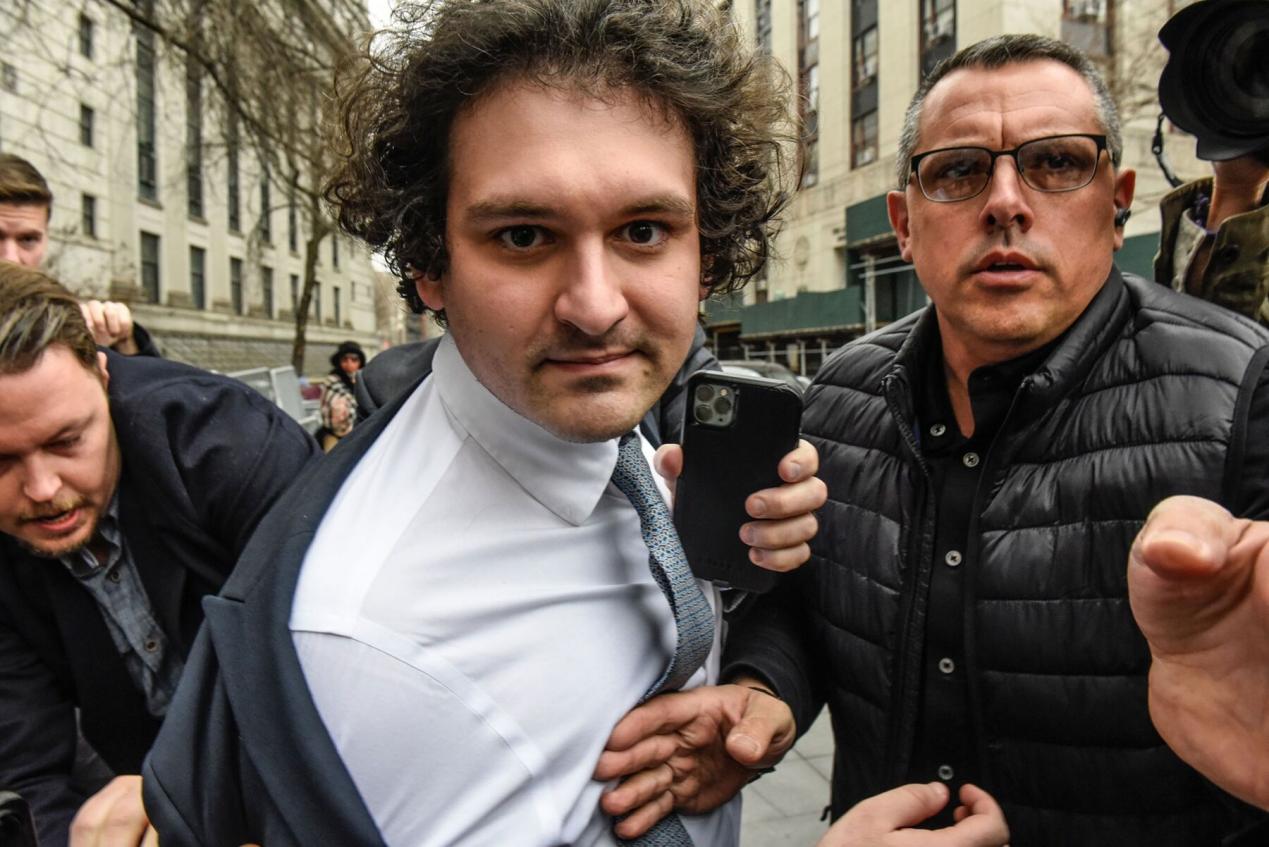
SBF
Beyond the commitment to doing good, running a cryptocurrency business is always legally complex. SBF founded a hedge fund called Alameda Research in 2017 aimed at exploiting price differences between cryptocurrencies traded in Asia and the U.S. Soon, the fund was transferring large sums of money between continents in ways that looked (as he boasted on a podcast) exactly like money laundering. Alameda had difficulty opening bank accounts.
SBF needed lawyers. Fortunately, there was a very suitable person. In August 2022, Joseph Bankman stated on the FTX podcast, "From the beginning, as long as I am useful, I will lend a hand." He added that the company had no lawyers at the time, "I think my role is quite obvious."
Former Alameda staff said Joseph Bankman helped draft early legal documents. Invoices from Alameda's law firm Fenwick & West show that Joseph Bankman was a participant in meetings, indicating that he was involved not only in tax issues but also in the development of FTX and FTT marketing materials.
FTX was headquartered in Hong Kong until 2021 when the Hong Kong government began cracking down on cryptocurrency. A person familiar with FTX's operations said Joseph Bankman played a key role in the decision to relocate to the Bahamas, which had almost no restrictions on digital currencies. The specific details were arranged by a lawyer personally hired by Joseph Bankman—Daniel Friedberg, who had been a lawyer at Fenwick & West and later became FTX's general counsel.
For employees, SBF gave the impression that he frequently consulted his father. A former employee said that when someone offered legal advice, SBF would usually say it sounded good, but he wanted to "call Joseph Bankman first." This employee also noted that almost all the lawyers working for Alameda seemed to be friendly with Joseph Bankman.
Other former employees said SBF sometimes had difficulty making eye contact when dealing with employees and could be blunt, almost cruel, while his father had a way with people. Joseph Bankman's training as a therapist made him an excellent listener, and he was also an energetic conversationalist. Joseph Bankman would ask employees about their personal lives, participate in cricket matches (a sport the employees were passionate about), and attend company dinners. Barbara Fried also attended FTX dinners but appeared less frequently in the office. They acted as mediators between the staff and their son. If SBF said something harsh or difficult to understand, his father would try to explain or simply say he understood that his son could be hard to deal with. One employee recalled that Joseph Bankman was seen as "a lovely old man, a capable but non-threatening figure who could prevent his son from losing control in the company."
But the most important role Joseph Bankman and Barbara Fried played was in helping their son gain the trust of people who might otherwise be reluctant to do business with a rough-and-tumble upstart. According to two insiders, in 2021, when SBF approached Sequoia Capital for a significant investment, the firm was interested in backing a global cryptocurrency exchange but was concerned about potential legal and regulatory risks.
FTX operated offshore and on the fringes of legality. To put it mildly, many founders of competing companies appeared morally flexible. Binance's Changpeng Zhao is under investigation by U.S. and other authorities. He denies wrongdoing but has refused to disclose the exact location of his company's headquarters. BitMEX co-founder and former CEO Arthur Hayes was charged with failing to prevent money laundering on the platform. According to a federal indictment, he boasted that he set up BitMEX's headquarters in the Seychelles, a small island nation in East Africa, because bribing regulators there "only took a coconut." He resigned and ultimately turned himself in to authorities before pleading guilty.
FTX's core business was similar to Binance and BitMEX, but SBF was convinced that his long-term goal was to gain approval from U.S. regulators. Moreover, he had something other companies lacked: the endorsement of a former SEC commissioner. Insiders say that after a call from a former prominent SEC official, Sequoia Capital was persuaded to invest. This former SEC official had previously consulted informally with the firm on earlier deals and now teaches at Stanford. The former official spoke in support of FTX's legal strategy—which involved operating offshore while striving to win approval from U.S. regulators—and noted that SBF just happened to be the son of his friend.
This endorsement was one way in which "Sam's parents undoubtedly opened doors for him," said a person involved in SBF's efforts to gain acceptance from U.S. politicians for his company.
At that time, Barbara Fried had already established a left-wing super PAC called "Mind the Gap," which positioned itself as a Silicon Valley faction of the "resistance movement." The organization provided advice to well-known tech donors, including former Google CEO Eric Schmidt and LinkedIn co-founder Reid Hoffman, on where to direct campaign contributions. The elite donor circle welcomed a new member in 2020: Barbara Fried's son, who donated over $5.5 million to Democratic and Democratic-aligned groups that year, immediately making him a player in Washington, D.C. In 2022, he donated about $40 million.
Barbara Fried directly funded candidates recommended by Mind the Gap. Former FTX executive Nishad Singh admitted to funneling FTX customer funds to political causes supported by Barbara Fried and donated $1 million to Mind the Gap in 2021, making him the largest donor in the PAC's recent election cycle. Mind the Gap has not been accused of wrongdoing.
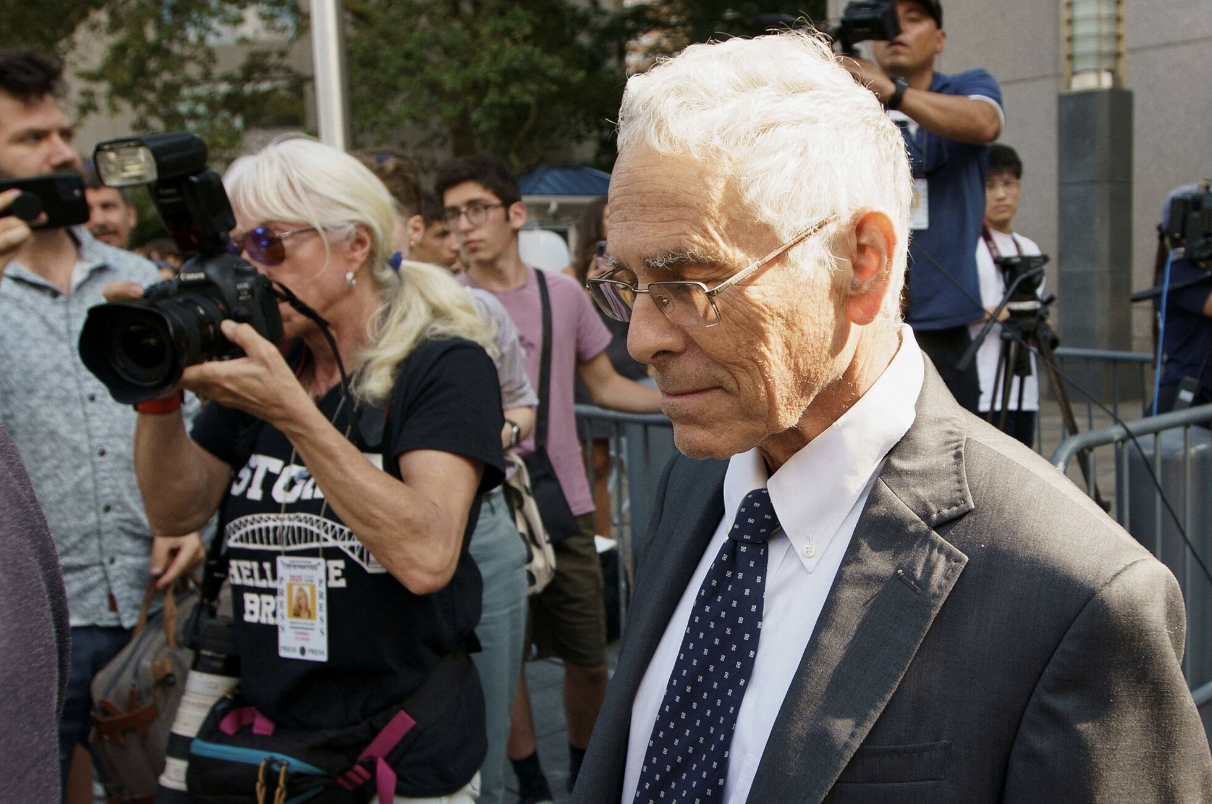
Joseph Bankman
Meanwhile, Joseph Bankman frequently accompanied his son to meetings with regulators and elected officials. Joseph Bankman also appeared at FTX events as a spokesperson for the company's charitable efforts. He continued to advocate for tax reform but sometimes introduced a new interest: cryptocurrency.
In appearances on FTX's podcast, Joseph Bankman promoted a pilot project he was running in South Florida that would provide digital wallets for the poor as an alternative to bank accounts. "If you are not part of the financial system, everything becomes more difficult," he said. "The cost of cashing checks is high. The cost of transferring money is high. So this is a national disgrace." Joseph Bankman promised that FTX would address this issue.
In magazine profiles and television interviews, SBF presented himself as very down-to-earth. He wore worn-out sneakers, lived with roommates, drove a Toyota Corolla, and donated all his savings to charity. In early 2022, SBF told a Bloomberg reporter, "You won't find a real way to make yourself happier by spending money. I don't want a yacht."
In reality, SBF and his inner circle indulged in a lavish lifestyle, as described by staff working on the Super Bowl ad, where the office felt like the Emerald City in The Wizard of Oz. The company purchased hundreds of millions of dollars in luxury real estate, including a $30 million penthouse in the Bahamas' most luxurious resort, where SBF and his partners lived. They rented private jets for themselves, and since Amazon did not always deliver to the island, they also rented online packages. And—as indicated by the bankruptcy filings—they even bought a 52-foot yacht, which was purchased by Alameda for then co-CEO Sam Trabucco.
SBF's parents also seemed to share in the "spoils." They flew first class, sometimes on private jets. Upon arriving in the Bahamas, they often stayed in a $16 million waterfront apartment. FTX spent about $250 million acquiring that residence and over thirty other properties on the island. SBF's parents, through their spokesperson, stated that they viewed the apartment as company property rather than their own.
SBF expressed a similar sentiment during an interview at a New York Times event. "I know this is not their long-term property," he said. "I don't know how this was written out."
A sales document obtained through a public records request in the Bahamas reportedly shows that SBF's parents signed as co-owners of the apartment on April 7, 2022, with a Bahamian notary as a witness. The document does not mention FTX and refers to the property as a "vacation home." "The house was used as temporary housing while Joseph Bankman worked in the Bahamas," the couple's spokesperson said in a statement. "Outside counsel confirmed to Joseph Bankman and Barbara Fried that FTX would hold all beneficial ownership of the house and agreed to document that in writing."
Around the same time, Joseph Bankman received a $10 million gift from his son. Ray, the head of FTX's bankruptcy proceedings, filed a lawsuit claiming that SBF obtained this money by borrowing from accounts containing customer funds. According to the lawsuit, he did so after consulting with someone who had become a senior legal advisor for personal and professional matters—his father. The lawsuit claims that the loan was never formalized—there were no loan agreements, promissory notes, or other indications that SBF took the funds from Alameda for anything other than benefiting his family. His father transferred nearly $7 million to a personal bank account; the rest he kept on FTX.
Given the soaring cryptocurrency prices at the time, it seemed a logical decision for Joseph Bankman to keep some savings on FTX, not to mention it was an opportunity to practice his newly adopted values, but within months, a market-wide sell-off led him to lose $1 million and ultimately jeopardized FTX itself. As the company neared bankruptcy, SBF publicly claimed everything was fine while seeking his father's help to minimize losses. "FTX's assets are sufficient to cover all customer assets," he wrote on Twitter (now known as X) (later deleted), "We do not invest (misappropriate) customer assets."
Behind the scenes, his father conveyed a very different but ultimately more honest message: FTX was in trouble and needed cash. An insider said that on November 7, when SBF spread false information, the next day, he and his father, along with other executives, hid as they tried to deal with what they described as a run on the bank. Joseph Bankman communicated the same message to investors, including former Trump White House press secretary and financier Anthony Scaramucci, stating that he first learned of FTX's troubles on November 7.
Scaramucci said Joseph Bankman described a "liquidity mismatch" of about $1 billion during a phone call that morning. But in a second call later that day, Joseph Bankman stated that the figure was actually $4.5 billion. Ultimately, Scaramucci learned from another FTX employee that the actual amount was $7 billion. "I think Joseph Bankman wanted to help his son, but he got caught up in the mess that was happening," Scaramucci said. "You want to think of the absolute best side of your child."
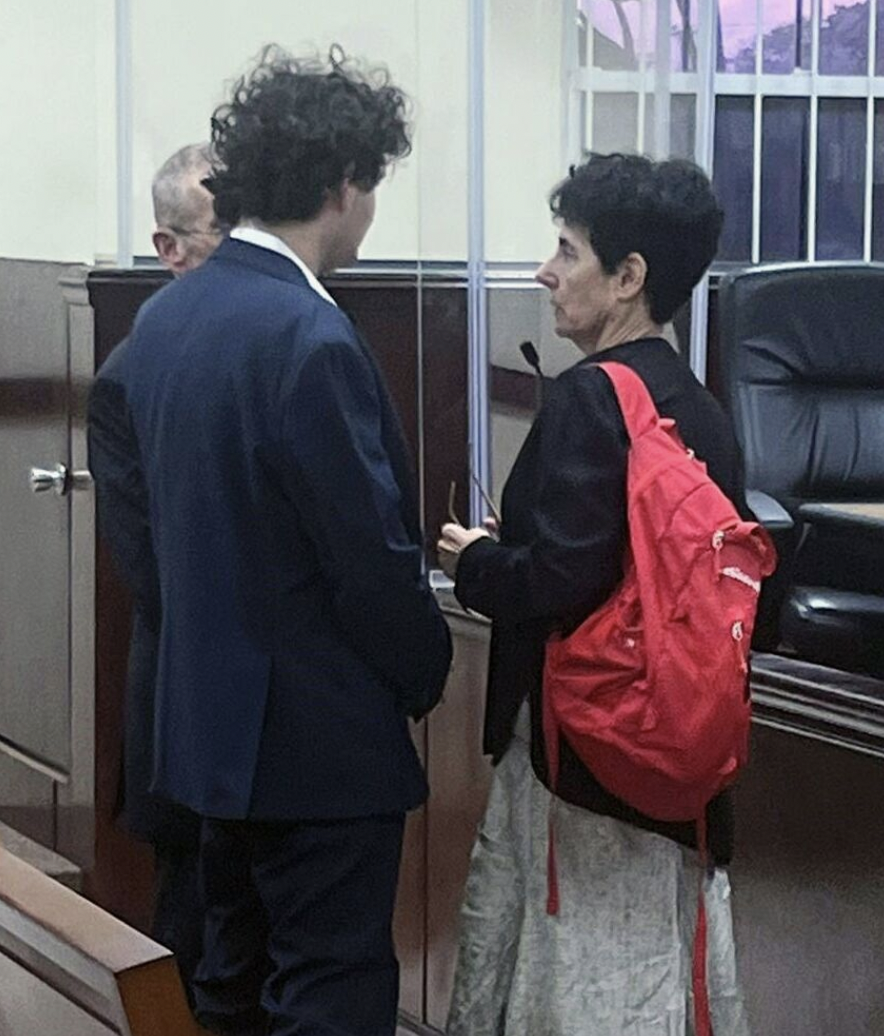
SBF and his mother
In the following days, Bankman appeared in emails sent to the Bahamian Attorney General and the country's top securities regulator, where they received news about potential misappropriation of funds and sent increasingly frantic messages, in short, asking what exactly was happening. SBF copied his father, trying to delay their itinerary. He mentioned a "liquidity gap" and promised that the company was doing everything possible to find investors. In a subsequent email, his father also copied the email, proposing to repay Bahamian investors ahead of others—federal prosecutors believe this proposal was essentially an attempt to "buy" influence in the country.
Just before filing for bankruptcy, Bankman urged regulators and creditors to avoid hasty judgments. Insiders said his initial stance was that the FTX managers were just misguided kids. He explained that they would return the money, and then everyone could go back to their lives.
However, SBF's parents did not attempt to return cash. They did not explain why, but the lawsuit filed by Ray on behalf of FTX creditors hinted at a reason: they needed the money to fund their son's criminal defense.
SBF was arrested in mid-December last year, subsequently extradited to the U.S., and released on bail. The $250 million bail was provided by two colleagues of his parents at Stanford University, along with the deed to their house as collateral. While awaiting trial, SBF was required to stay at home. This sudden turn of events shocked friends and Stanford faculty who had just gotten used to seeing the child they knew at Joe and Barb's as a cryptocurrency billionaire. Now, he had become the mastermind of one of the largest fraud cases in U.S. history. As SBF returned home, security barriers were erected, blocking the road home. Students and media personnel paused to watch; SBF's parents told friends that they bought a German shepherd out of concern for their safety.
"All of this is a pathological conspiracy," said Tim Rosenberger, who graduated from law school earlier this year. "Are they going to hire a new professor? Who will teach tax law?"
In group chats among former FTX employees, debates about whether the parents were aware of the alleged crimes were intense. Meanwhile, friends of the couple have struggled to understand how two people known for their ethics could commit such serious moral failures. In August, prosecutors accused SBF of leaking damaging information about a former employee in an attempt to intimidate a witness. His lawyer denied the allegation, but he was sent to the Metropolitan Detention Center in Brooklyn.
When her son was detained, Barbara Fried was in the audience, tearfully trying to approach him. "That's my son!" she said when a U.S. marshal stopped her. She watched as SBF followed standard procedures, removing his jacket, loosening his tie, and bending down to untie his dress shoes. As his mother sobbed, his father wrapped an arm around her shoulder.
Friends say they are very worried about the couple. Since SBF's arrest, both parents have not taught classes. Joseph Bankman canceled his courses, and Barbara Fried retired from the school two months before FTX's collapse and resigned from her political nonprofit. "Such a thing happening in a family full of wisdom and goodwill is devastating," said Stanford professor and family friend John Donohue III.
"It's hard to think, 'How could they not know?'" said another friend who wished to remain anonymous. "The most reasonable explanation I can understand is that it was blind faith. They did not have the full picture."
This is certainly plausible. If the prosecutors' narrative is accurate, SBF's deceit was sociopathic—deceiving not only investors but also business partners and even his own employees. It is no exaggeration to say he may have exploited his parents—and their illustrious academic careers—to build an exploitative enterprise. SBF claimed multiple times to be a billionaire. Why didn't he buy his parents a nice house? Why couldn't his father participate in the Super Bowl shoot with Larry David?
But critics say that even if they were unaware of the alleged misappropriation, the parents should bear some responsibility. Barbara Fried's moral compass could explain how her son could overlook obvious moral flaws in service of what he believed to be a greater good. The thinking goes: if the end result is billions of dollars for charities saving the world, then what’s a little misappropriation?
Meanwhile, Joseph Bankman's involvement in providing legal advice now seems at least less reasonable. He was involved in multiple decisions, including the launch of FTX, the creation of FTT, the company's courting of politicians, and dealings with Bahamian regulators, all of which have been criticized by regulators and prosecutors as potentially illegal. Joseph Bankman was also involved in hiring FTX's general counsel Friedberg, who has been accused of enabling fraudulent behavior and attempting to cover up efforts to expose fraud, including bribing potential whistleblowers. These allegations were made in a lawsuit filed on behalf of FTX creditors, which included Joseph Bankman's urging to his son to rely on Friedberg, "so that we only have one person responsible for everything." Friedberg denies wrongdoing and has not been charged with a crime, but critics say his background is enough to make one "think twice"—including having worked for an online poker site in Canada that was accused of cheating players during his tenure.
Then there is Stanford University itself. Just a month before SBF's arrest, Elizabeth Holmes was sentenced to 11 years in prison for fraud related to her medical device company Theranos Inc. She founded the company while a student on campus and recruited prominent faculty to serve as employees and board members. The Holmes case, combined with Stanford President Marc Tessier-Lavigne's resignation over allegations of data manipulation in several academic papers, has led some professors and students to question why the school did not catch the misconduct cases sooner.
Defenders of Stanford, including Donohue, point out that Stanford is not the reason for SBF's alleged crimes; it is at most just a backdrop. But the backdrop is important. Coming from a place like Stanford, with accomplished parents, changes the world's perception of your shortcomings. Some behaviors that might be seen as unserious, like playing video games during meetings, become evidence of talent.
For the past ten months, SBF has been trying to shift the blame to former employees, lawyers, and business competitors, insisting that his mistakes were due to carelessness rather than malice. "I messed up" was his exact phrase in congressional testimony he wrote before his arrest. He seems to be saying he was just a kid far out of his depth.









